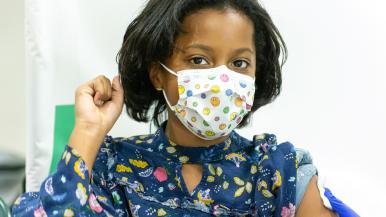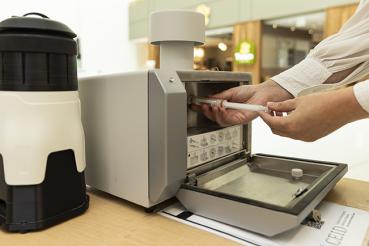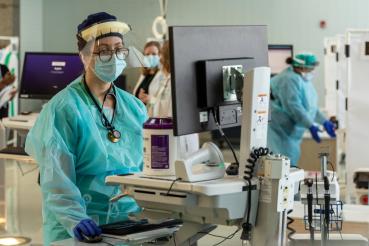Rush physicians, nurses and staff will be among the first parents in line to get their school-age kids vaccinated at Rush or through their pediatricians’ offices. Children ages 5 through 11 are now eligible for two shots of Pfizer-BioNTech’s lower-dose vaccine, given three weeks apart.
Here’s what Rush parents had to say about their decision.
‘We’ve been waiting for this for a long time’
“I appreciate parents wanting to really think about what the vaccine means for their child and the safety surrounding it,” says Colleen Nash, MD, a pediatric infectious disease specialist at Rush and mom of two school-aged kids. “But I think the long and short of it is, all of the benefits of the vaccine make it an absolute yes for me.”
Although Nash knows from the data that kids are less likely to get severe COVID-19 and require hospitalization, she still wants to do everything she can to reduce the risks. “I have seen kids who were sick from COVID-19 who weren’t supposed to be sick,” she says. She has also seen young patients hospitalized with multisystem inflammatory syndrome in children (MIS-C), a condition that causes inflammation throughout the body in some kids who get COVID-19. “If there’s any possibility to prevent that, I want to take advantage of that,” she says.
But Nash also believes that the vaccine is not just about protecting against COVID — it’s also about reducing the disruption to the family if one of her kids gets exposed and has to get tested, miss school and quarantine at home.
For all of those reasons, she plans to get her children vaccinated at Rush as soon as she can. “We’ve been waiting for this for a long time,” she says.
‘I see this as the obvious next step in doing my best to keep them safe’
Lyndsay Fundell believes the vaccines are not just important for protecting her 6-year-old daughter who has asthma and her 8-year-old son from severe COVID-19 but also for getting the country back to normal.
“Not only will our family be safer when we are fully vaccinated, but everyone we interact with in the community will be safer, too,” says Fundell, sonographer supervisor at Rush. “As a parent, I know I can’t protect my kids from everything, but we take so many steps to do our best. We worry about how we feed them, who they are around, how they ride in the car and so on. I see this as the obvious next step in doing my best to keep them safe.”
Fundell believes the vaccines are safe because the research behind their development has been going on for decades. She also feels reassured that the vaccine dose has been tailored to kids. “The scientists and researchers behind the kids’ vaccines know that kids are not just little adults — they adjusted the dosage accordingly to keep kids safe,” she says.
How do her kids feel about getting the vaccine? “Truthfully, my kids hate shots as much as any other kids, but they are looking forward to this one,” Fundell says. “I’ve been trying to prepare them by talking about it positively. They know this is key to getting back to all of the people and activities we miss so much. I think there may still be a few tears and definitely a special treat on the way home.”
‘My son wanted the vaccine for his birthday’
Jane Krivickas, a nurse who oversees the transfer center at Rush, was pleased — and a little surprised — when her school-age son requested the vaccine for his birthday a few weeks ago. Her daughter, too, is ready to get her shots. That’s because her kids have seen the toll that pandemic stress has had on their parents, who both work in health care. Plus, her kids are tired of worrying that their classes will be shut down because of a suspected COVID-19 case at school. “We don’t want to live like that, they don’t want to live like that,” Krivickas says. “They hate Zoom. They’re both very social kids.”
While she is confident in her decision to vaccinate her kids, she understands why some parents are hesitant. “It is hard as a parent and even as a non-parent to trust, and that’s what we’re asking the world to do,” she says. Yet as a self-described “data person,” she believes the benefits of getting her kids protected against severe disease and hospitalization from COVID-19 far outweigh the risks, which include rare cases of myocarditis (inflammation of the heart muscle). She finds it helpful to remember that every activity has risks. “We take a risk every time we get in a car. We take a risk every time our kids play sports,” she says.
In addition to reviewing the data to make her decision, Krivickas also considered how vaccines have helped eradicate or control diseases throughout history. “We have to trust in this data and the science,” she says.
‘It may enable my kids to have some freedom that they haven’t had’
Brian Stein, MD, a pulmonologist and chief quality officer at Rush, says his 11-year-old boy and 9-year-old girl want to be vaccinated so they can be better protected like their older friends. While his family still plans to be cautious about social gatherings after his kids are vaccinated because no vaccine is 100% effective, “it may enable my kids to have some freedom that they haven’t had,” Stein says. And because his kids will be vaccinated, there’s less of a chance that they will be sent home to quarantine after a potential exposure at school.
Beyond the family benefit, Stein says getting his kids vaccinated is the right thing to do to help others. “If you can keep kids from developing COVID and spreading COVID, you will potentially be protecting their grandparents or other family members who may be at higher risk for complications,” he says. “So it’s a population benefit and another step toward ending the pandemic.”
‘A super cool Band-Aid and some TLC’
That’s what Sindhura Bandi, MD, an allergist at Rush, plans to give her two kids when they get the COVID-19 vaccine (her 7-year-old is eligible now, and her 4-year-old will need to wait a bit). She plans to have them vaccinated at Rush or through their school as soon as possible.
“I empathize with fellow parents in that being a parent is hard enough, let alone coordinating schedules,” she says. “The great news is that the rollout for the COVID vaccine for elementary-age children aims to reduce any barriers for busy parents.” Beyond hospitals like Rush, kids can get their shots at schools, physician offices, pharmacies and community centers, she adds.
Bandi says the available data suggests that, for the vast majority of children, the benefit of receiving the vaccine is clear. “Immunizations save lives,” she says. “They protect our children, those we care about and future generations. This rings even more true in the midst of a global pandemic.”




